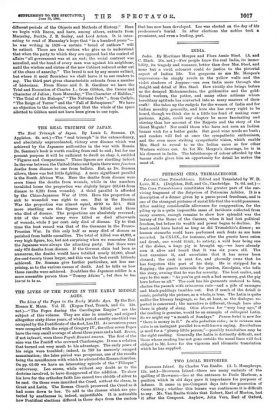THE REAL TRIUMPH OF JAPAN.
The Real Triumph of Japan. By Louis L. Seaman. (S. Appleton. 6s. net.) —The " real triumph" is the extraordinary, and absolutely unprecedented, victory over disease which was achieved by the Japanese authorities in the war with Russia. Dr. Seaman's book is worth reading from end to end; but for our present purpose it will be sufficient to dwell on chap. 5, entitled "Figures and Comparisons." These figures are startling indeed. In the war between the United States and Spain there were fourteen deaths from disease to one from bullets. But, as Dr. Seaman allows, there was but little fighting. A more significant parallel is the South African War. Here the deaths from disease were seven times the deaths from wounds, while in the numbers invalided home the proportion was slightly larger (63,644 from disease to 8,221 from wounds). A third parallel is afforded by the Chino-Japanese War of 1894. Here the proportion of sick to wounded was eight to one. But in the Russian War the proportion was almost equal, 49.99 to 50.1. Still more startling are the figures for the killed and those who died of disease. The proportions are absolutely reversed ; 8.83 of the whole army were killed or died afterwards of wounds, while 2 per cent. only died of disease. Up to that time the best record was that of the Germans in the Franco- Prussian War. In this only half as many died of disease as perished from battle casualties. The total of killed was 43,892, a very high figure, too, but not surprising when we remember that the Japanese were always the attacking party. But there were only 876 deaths from disease. If the German slain had been as numerous, the deaths would have totalled nearly 22,000, about five-and-twenty times larger, and this was the best result hitherto achieved. Dr. Seaman give further particulars, not less sur- prising, as to the various causes of death. And he tells us how these results were achieved. Doubtless the Japanese soldier is a more amenable person than "Tommy Atkins "; but then he has learnt to be so.


























































 Previous page
Previous page